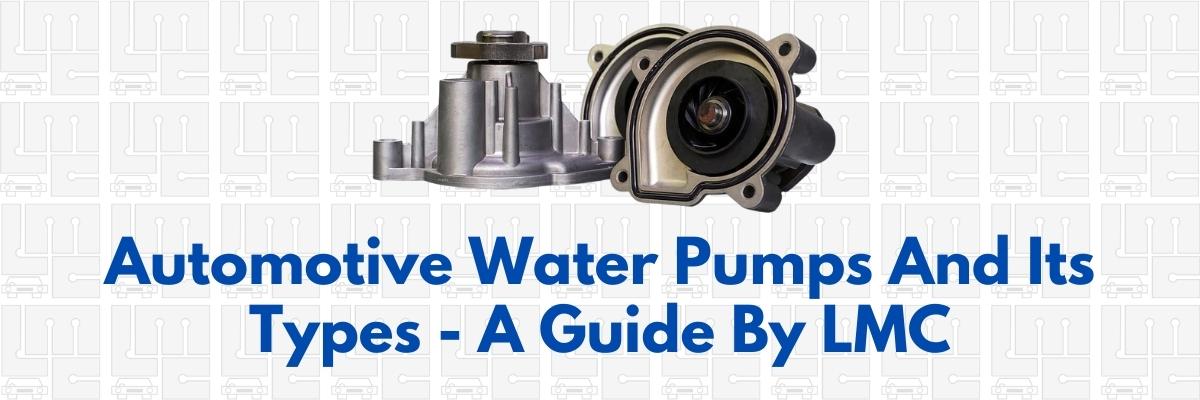AUTOMOTIVE WATER PUMPS AND ITS TYPES - A GUIDE BY LMC
The water pump used in automobiles is a standard centrifugal pump that is powered by a belt attached to the engine's crankshaft. The fluid is pumped around when the engine is running. The water pump, which is typically powered by a belt from a crankshaft pulley or sprocket, is essential to the running of a car engine because it makes sure that coolant flows through the cylinder head, radiator, hoses, and cylinder block and maintains the ideal automotive operating temperature.
To move coolant through the variety of hoses and channels that make up the cooling system, an automotive water pump uses centrifugal force and impeller blades. The coolant is hosed to the radiator after passing around the engine, which is generally near the front of the car, where the hot coolant is cooled by the circulation of air along with the radiator fins. The process then exits the radiator and goes back to the water pump, where it is restarted.
Different types of Automotive Water Pumps for Automobiles
Understanding how to distinguish between the many types of water pumps is crucial to have a thorough understanding of them. On the one hand, there is a difference between water pumps for passenger cars and those for trucks and commercial vehicles, with each one according to the unique needs of each type of vehicle. On the other hand, they fall into the following categories:
1. Electric Water Pumps
Electric water pumps help modern engines in reducing emissions from them. Cooling according to needs is made possible by a supply flow that is independent of the motor's number of revolutions. As a result, less power is needed, which lowers the use of fuel, friction losses, and the emissions of pollutants.
2. Mechanical water pumps
The coolant in mechanical water pumps absorbs all the heat from the engine block and cylinder head and discharges it into the surrounding air through the radiator. Mechanical water pumps can either be installed directly on the engine block or they can also be mounted directly on the block of the engine, depending on the particular type of construction. Mechanical water pumps are generally driven by timing belts, V-belts, or even directly from the engine.
3. Auxiliary water pumps
Supporting the main water pump of a vehicle is the basic function of auxiliary water pumps. The main focus of the auxiliary water pump is on comfort, as it is located in the by-pass hose of the main cooling system, it carries the coolant to the heater that is inside the car.
Depending on how complicated the cooling system is, there can be more than one auxiliary pump in some vehicles. As the batteries and electric motors are both cooled, these auxiliary water pumps are also utilized in hybrid and electric vehicles in order to distribute coolant to all the corners of the entire system of the vehicle.
4. Variable water pumps
The key feature of variable water pumps is their ability to adjust the flow rate in accordance with the demands of the engine, which is carried out by a vacuum process. In other words, the water pump only affects the cooling system when it is required to. In doing so, it contributes to improving the efficiency of the engine, which results in lower fuel consumption and, consequently, a significant reduction in the emission of pollutants into the atmosphere.
Which one is the best suitable? Electric water pump or Mechanical water pump?
There are different benefits of each water pump; in contrast to mechanical water pumps, electric water pumps can work flexibly in response to the real cooling demand of the motor and have speeds that are independent of motor speed. As a result, there will be a decrease in the consumption of fuel and an increase in efficiency, while there will be a decrease in mechanical losses and transmission of heat.
The electric water pump is resistant to high temperatures and corrosion well. The electric water pump reduces the displacement of the water pump by about 60% and offers high efficiency, precise control, timely and appropriate cooling capacity, and low power consumption of the coolant flow based on the water temperature and other information.
Electric water pumps are driven by electricity, which reduces friction in comparison to mechanical water pumps that use an auxiliary belt drive. In contrast, an electronic water pump enables the manufacturer to precisely control how much coolant goes through the engine at predetermined temperature ranges. So it's actually more effective and better suited to the particular cooling requirements of your vehicle’s engine.
Conclusion
So this is our complete guide for automotive water pumps and their types. You can choose a water pump that best suits your car’s engine. And if you are looking for water pumps for your car then Lakshmi Motor Company (LMC) has the best quality water pumps for you. We have established ourselves as a world leader in the manufacturing of water pumps and other auto spare parts. We have always manufactured the best quality water pumps for automobiles and trucks, which enables us to offer a variety of mechanical, electric, variable, and auxiliary water pumps with the most experience on the market. LMC provides a wonderful range of water pumps that will meet all of your automotive demands, so if you're searching for the ideal one for your car, look no further. Other than India, LMC exports its products to other six countries of the world that are, Morocco, Russia, Turkey, Poland, Israel, and Brazil. We have the best products for automobiles and have a very large market For further information, just get in touch with us.

